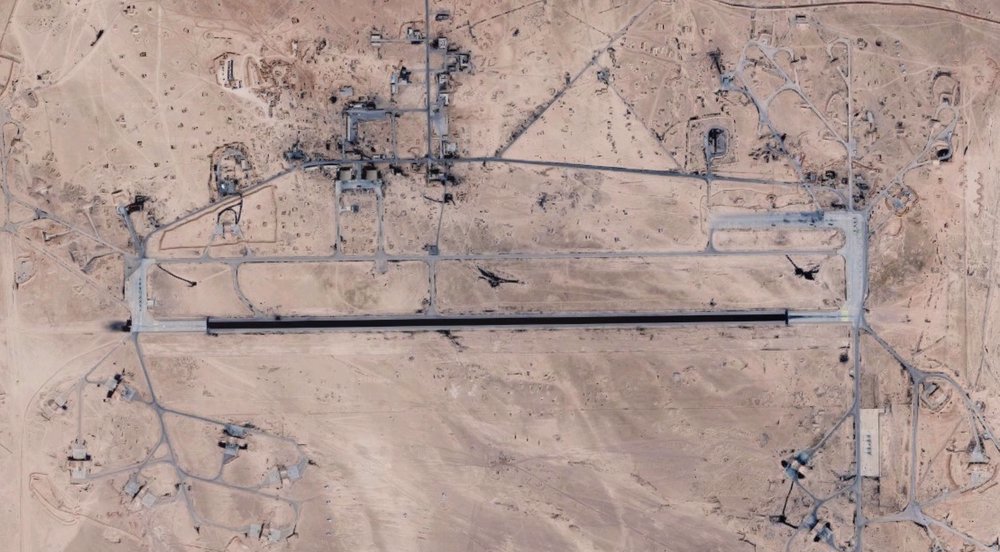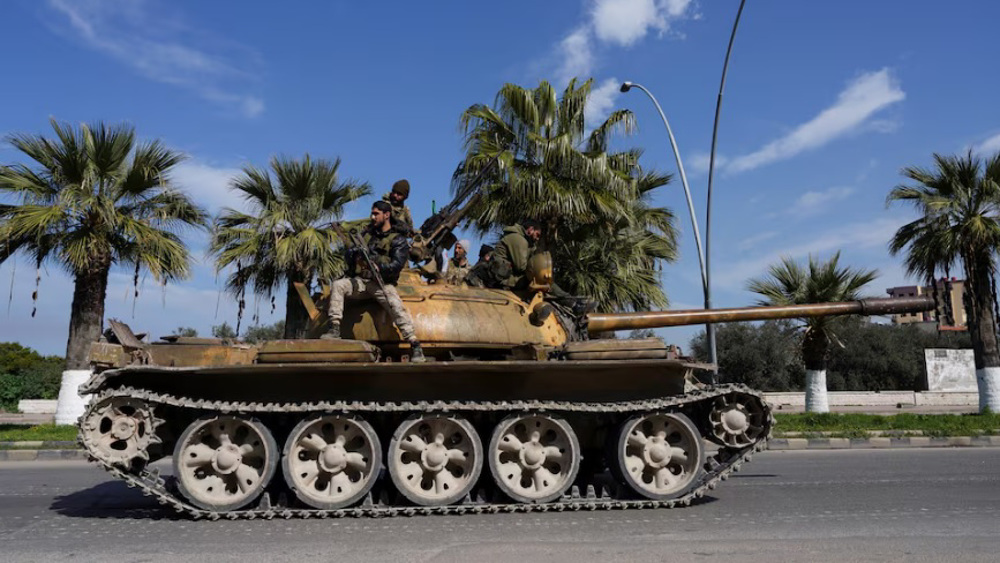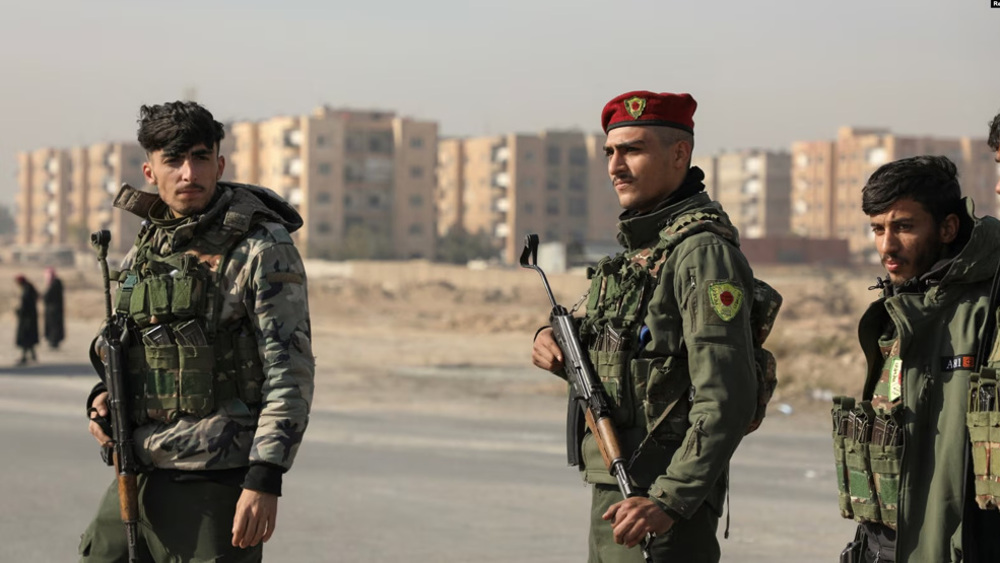US, UK, Jordan deploy troops, tanks in southern Syria: Reports
Reports coming out of Syria suggest that a joint military force of US, British, and Jordanian troops, equipped with tanks and helicopters, have reportedly been deployed in the war-torn country's southern border areas from Jordan's northern region.
The troops are now reportedly positioned in a long strip region across the border zones of Syria's southern provinces of Dara'a and Suwayda, from Tel Shahab rural area, just a few hundred meters from the Jordanian border, to al-Nasib Border Crossing and Khirbet Awad village.
The forces have also been seen near Ramtha, a Jordanian city, located in the far northwest of the Arab country close to the Syrian border.
The media bureau of Syria's Joint Operation Command also released a number of aerial photos (shown below), taken by drones, which purportedly showed the presence of a large number of British Challenger tanks, UK's main battle tank (MBT), and American Cobra and Black Hawk helicopters.

The exact number of the ground troops is not known, but according to local reports, some 2,000 soldiers have been deployed along the border between Syria and Jordan.
Other reports said some 4,000 troops, trained in Jordan, are positioned in al-Tanf border area.
Syrian and Jordanian officials have not yet commented on the alleged deployment of the multinational military force.
Hussain Mortaza, the head of al-Alam bureau in Syria, said on Monday that Damascus and its allies were closely monitoring military activities of the US, UK and Jordan in the southern regions of Syria. He described the move as a multinational military exercise allegedly held to eliminate threats posed by the Daesh Takfiri terrorist group. He said, however, that the move was meant to prepare for attacks against the Syrian capital.
Mortaza said Daesh terrorists were not present in the area and the real mission of the multinational force, reportedly commanded from Jordan's Al Zarqa military base, was actually hidden under the cover of the so-called Daesh threat.
Back in March, an AP report revealed that Washington had spent to date more than $11.5 billion on its intervention in Syria, including the training and advising of local militants and foreign mercenaries, aimed at overthrowing the government of Syrian President Bashar al-Assad in alliance with Saudi Arabia, Turkey, Qatar, Jordan, the United Arab Emirates and the Israeli regime.
It added that the White House was even considering expansion of its military presence in the Arab country.
Read more:

The military action, coupled with American officials’ change of tone over Assad's future, stirred speculation that the United States and its Western allies were ready to put boots on the ground in Syria.
The US has already sent several hundreds of its special operation forces to Syria under what it claims to be a training mission with Kurdish fighters. The US and its allies have also been carrying out airstrikes against purported Daesh positions in Syria since 2014, without permission from Damascus.
On April 12, US President Donald Trump, however, ruled out the possibility of deploying American troops to Syria to fight Assad, saying that curbing Daesh remained Washington’s first priority.
On April 28, Kurdish activists reported that they had spotted a convoy of armored vehicles with US flags on a rural road in the village of Darbasiyah, a few hundred meters from the Turkish border in Syria's northeastern province of Hasakah.
Read more:
- Trump: US won't send troops into Syria
- Trump's decision to deploy US troops to Syria
- US deploys troops to Syria-Turkey border
- Turkey deploying troops to Syria's Idlib?
The deployment pitches relatively inexperienced American soldiers into the middle of a highly toxic, multi-fronted battlefield that includes several foreign-backed Takfiri terrorists who are supported by allies of the US.
The West has also been pressuring Russia to withdraw its support for Syria. Both the UK and the US have proposed more sanctions against the Russian government in case the support continues.
Moscow launched its campaign against Daesh and other terror outfits in Syria upon the Damascus government’s request. Russia's strikes have helped Syrian forces advance against foreign-backed militants operating in the Arab country since 2011, and played a deceive role in weakening ISIL terrorists.
Read more:
The latest reports came three days after a deal on forming four de-escalation zones across eight of Syria's 14 provinces came into force.
The four zones are only safe for the so-called armed opposition factions and exclude the Takfiri terrorist groups of Daesh and Jabhat Fateh al-Sham, formerly known as al-Nusra Front.
The deal took effect at the stroke of midnight local time on Saturday. It came two days after Iran, Russia and Turkey signed an agreement during the fourth round of Syria peace talks in the Kazakh capital, Astana. The co-sponsors have until June 4 to finalize the zones' exact borders.

Turkey readies plans to take over Syria’s T4 airbase: Report

Gunmen kill 12 civilians in western, central Syria on 1st day of Eid al-Fitr

Syria's Kurds reject legitimacy of new 'transitional government'
US orders social media screening for student visa applicants to bar those critical of Israel
VIDEO | Iran marks anniversary of Israeli attack on embassy in Damascus
Hamas slams Ben-Gvir’s storming of al-Aqsa Mosque as ‘dangerous escalation’
Moving against global tide, Israel eliminates all tariffs on US goods
VIDEO | Press TV's news headlines
Key well launched at Phase 11 of Iran’s South Pars gas field
Iran says US threats of military action will ‘complicate situation’ for talks
ICC censures Hungary for ignoring Netanyahu arrest warrant







 This makes it easy to access the Press TV website
This makes it easy to access the Press TV website